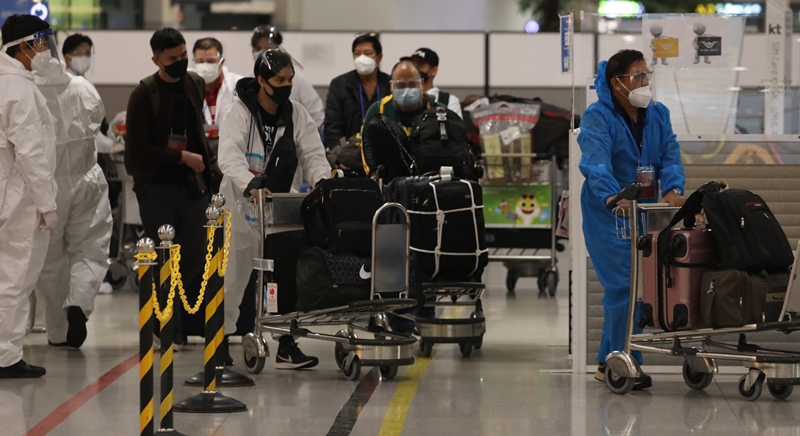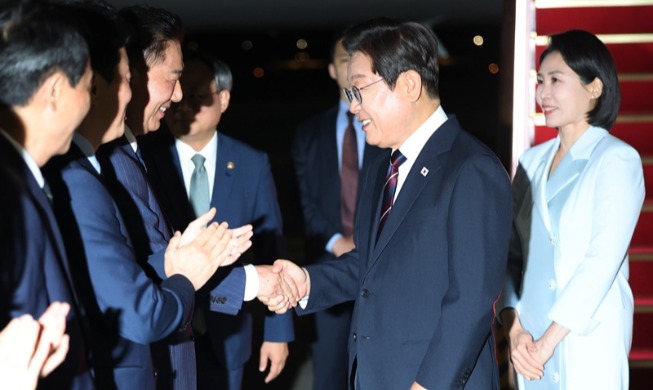
The government from Dec. 3 will reimpose 10 days of quarantine to all inbound travelers including Korean nationals for two weeks to prevent the spread of the Omicron variant of COVID-19. Shown are foreign passengers on Dec. 1 wearing personal protective equipment after arriving at Incheon International Airport. (Yonhap News)
By Park Hye Ri and Yoon Hee Young
Stricter quarantine measures are forthcoming to prevent the spread of the Omicron variant of COVID-19 in the wake of the first case of the variant being reported in Korea.
The Central Disease Control Headquarters under the Korea Disease Control and Prevention Agency on Dec. 1 said that from Dec. 3-16, all inbound travelers including returning Korean nationals must self-quarantine for 10 days after arrival in the country regardless of vaccination status.
Korean nationals and long-term residents must self-isolate at home for 10 days after being tested for COVID-19 before entering the country, on their first day of isolation, and right before the end of their quarantine. Foreign nationals on short-term stays must spend 10 days isolating at temporary facilities.
As of midnight on Dec. 3, the headquarters will designate Nigeria a country subject to tighter restrictions, high risk and exclusion from Korea's list of quarantine-exempt states and implement the same quarantine measures for eight African countries including South Africa.
Short-term arrivals from nine countries including Nigeria are thus banned from entering Korea. Korean nationals and long-stay residents must self-isolate for ten days at temporary facilities and get tested for COVID-19 four times (before entry into the country, on the first and fifth days afterwards, and right before the end of their quarantine).
From Dec. 4-17, three weekly non-stop flights departing from Ethiopia to Korea will be suspended for two weeks. Due to the temporary stop to the country's lone direct flight from the African region, the government will schedule irregular flights to allow the safe return of Korean nationals to the country.
Meanwhile, Seegene, Korea's leading company for molecular diagnosis, announced its creation of a diagnostic reagent to detect the Omicron variant.
The company said its diagnostic reagent Allplex SARS-CoV-2 Master Assay can detect four types of the original coronavirus as well as five of mutated variants. Among those detectable are three types of the mutated virus genes contained in Omicron, it added.
Seegene CEO Chun Jong-yoon said, "We will help prevent the spread of the virus worldwide through quick detection of the possibility of infection by the Omicron variant."
hrhr@korea.kr
Most popular
- Military discharge sets stage for reunion of all 7 BTS members
- 'We are back!' BTS Festa heralds hyped return of K-pop phenom
- K-pop streaming on Spotify skyrockets 470-fold in 10 years
- Presidents Lee, Trump discuss tariff deal in first phone talks
- President Lee leaves for G7 Summit in Canada on first int'l trip
